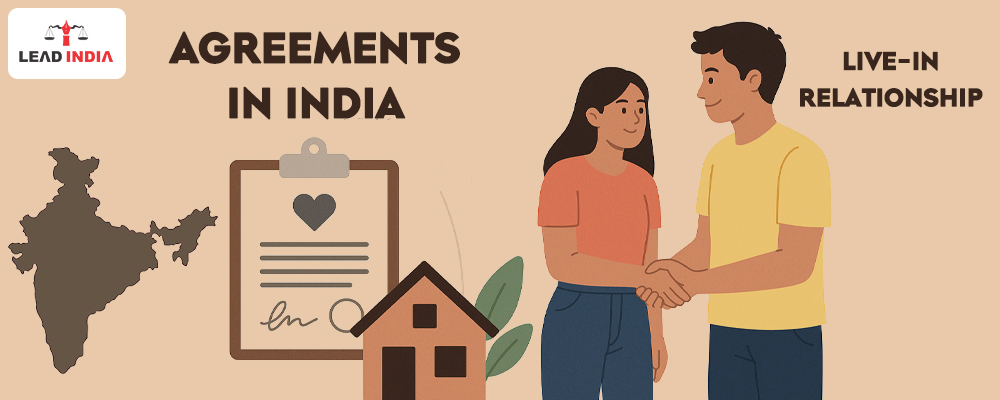If you’re planning to live with someone you love, without tying the knot just yet, you’re not alone. Live-in relationships are on the rise in India especially among couples who value freedom, companionship, and emotional connection over social conventions.
But here’s the catch: unlike marriage, live-ins don’t automatically offer legal protection.
That’s where a Live-In Relationship Agreement becomes your silent shield setting expectations, avoiding future misunderstandings, and showing that you both care enough to keep things clear.
What Is a Live-In Relationship?
In simple terms, it’s two adults choosing to live together under one roof without being legally married.
It’s a mutual decision a lifestyle that values freedom and partnership over formality. While the law may still be catching up, courts in India have increasingly started acknowledging such relationships, especially when it comes to women’s rights.
But for day-to-day life bills, assets, breakups, kids it’s not always straightforward. A written agreement helps couples cohabit with clarity and confidence.
Need A Legal Advice
The internet is not a lawyer and neither are you. Talk to a real lawyer about your legal issue

Why My Friend Chose to Draft One
Amit and his partner Priya had been together for over a year when they decided to move in. They were sure about each other—but they weren’t sure how to handle things like rent, shared furniture, or medical emergencies.
They didn’t want a marriage certificate. But they wanted something. Something that said: “we’re committed, and we’ve thought this through.” Their Live-In Agreement did exactly that.
Key Elements to Include in Your Agreement
Every couple is different. But here are 10 must-haves that make your agreement meaningful and legally useful:
- Who You Are: Full names, ID proof, and addresses.
- Living Terms: How long you plan to live together, and what happens if either of you wants to move out.
- Money Matters: How you’ll split rent, groceries, utilities, and savings.
- Property Stuff: Who owns what—and what’s jointly acquired.
- Children (if any): Plans for custody, schooling, healthcare, and finances.
- Conflict Handling: Mediation, therapy, or mutual discussion paths if things go south.
- Privacy Rules: Passwords, posting photos, sharing locations—agree on boundaries.
- Health & Emergencies: Medical decisions, insurance, hospital access.
- In Case of Death: Will, nominee rights, or how to handle jointly held assets.
- Legal Ground: Which state’s laws apply and how to amend the agreement.
Landmark Case: Indra Sarma v. V.K.V. Sarma (2013)
In a significant ruling, the Supreme Court protected the rights of women in live-in relationships.
- The Court said that even without marriage, women who’ve cohabited for years can claim maintenance if deserted.
- This case highlighted the fact that commitment without a wedding ring still deserves recognition.
- A written agreement, however, makes it easier to establish and secure that commitment.
Is It Legally Binding?
There’s no specific law for live-in couples. But the Indian Contract Act, 1872 allows adults to enter into agreements, provided:
- There is free consent
- The contract is not unlawful
- The terms are clear and reasonable
If these conditions are met, courts in India have accepted such agreements.
Why a Lawyer Matters
Legal documents aren’t just about wording—they’re about understanding and preparation. A well-drafted agreement should:
- Ensure Fairness: So both partners know their responsibilities and rights
- Stay Legally Valid: In case it ever needs to be enforced
- Reflect Your Life: Tailored to your lifestyle, assets, and priorities
An experienced legal professional can make all the difference in protecting what matters most to you.
Conclusion
- A Live-In Agreement isn’t about expecting the worst. It’s about being thoughtful. It’s a way to protect your bond from confusion or conflict.
- It doesn’t take away love, it adds trust. It doesn’t question commitment it strengthens it.
One can talk to lawyer from Lead India for any kind of legal support. In India, free legal advice online can be obtained at Lead India. Along with receiving free legal advice online, one can also ask questions to the experts online free through Lead India.
FAQs
1. Will Indian courts accept our agreement?
Yes, if it meets contract law rules and is fairly made.
2. Can I make my partner a nominee in bank or insurance papers?
Yes. But inheritance still requires a will or formal documentation.
3. Can we include loyalty/fidelity clauses?
Yes. These can show mutual expectations, even if not legally binding like marriage.
4. Will my partner get my property if I pass away?
Only if you legally declare them in a will or property deed.





 Talk to a Lawyer
Talk to a Lawyer